
How to Start a Job Board Business
Subscribe to The Job Board Academy
Are you thinking about starting a job board business? In this article, we'll cover everything you need to know to get your job board up and running.
Online job boards are platforms that allow job seekers to search for open positions and employers to advertise their vacancies. For a more in-depth definition and examples check out our post on what is a job board.
We'll start by discussing the importance of identifying your target audience and niche. Next, we'll explain how to choose a niche for your job board, and we'll discuss the different options to create a niche job board.
Finally, we'll cover some key strategies for launching and promoting your job board, as well as some tips for managing risks and challenges.
By the end of this article, you'll have a solid foundation for launching and growing your job board business.
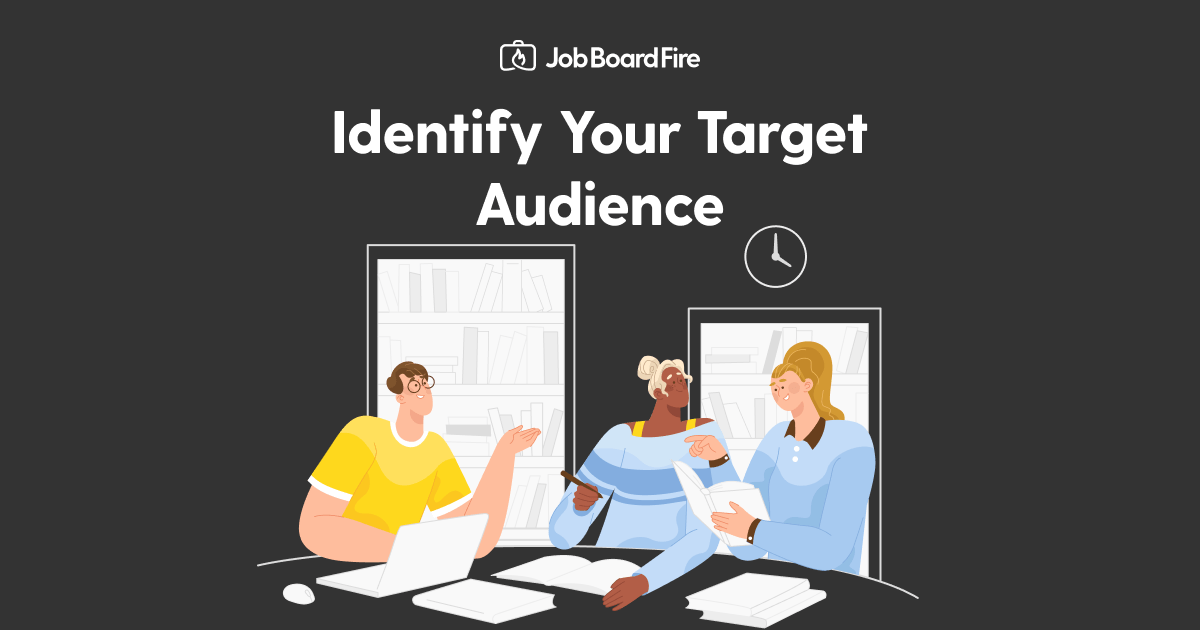
Identify Your Target Audience and Niche
Identifying your target audience and niche is an essential part of launching a successful job board business.
The Benefits of Choosing a Niche for Your Business
Choosing a niche can be an effective way to reach more people and grow your business. By specializing in a specific area, you can create tailored marketing campaigns that are more relevant to your target audience, which can help to increase brand awareness and attract more qualified leads. Additionally, by focusing on a specific niche, you can become a thought leader in your industry, which can help to boost your credibility and reputation. This can make it easier for you to connect with potential customers, as well as establish partnerships and collaborations with other businesses in your niche. Overall, choosing a niche can help you to reach more people and grow your business by focusing your efforts and resources on a specific group of customers.
By carefully selecting the types of job seekers and employers you want to help, as well as choosing a specific niche or industry for your platform, you can focus your efforts and resources on a specific group of customers, which can help to increase your chances of success.
How to Choose a Niche for Your Job Board
When it comes to choosing a niche for a job board business, there are a few key factors to consider. First and foremost, it’s important to identify the types of job seekers and employers you want to help.
This can include looking at the job market in your local area and identifying areas of high demand, as well as considering your own interests and expertise. For example, if you have a background in healthcare, you may want to focus on helping job seekers and employers in the healthcare industry.
Once you have identified the types of job seekers and employers you want to help, it’s important to conduct market research to assess the potential demand for your job board. This can include surveying potential customers to see if there is interest in your platform, as well as looking at competitors to see how they are positioning themselves in the market. By conducting thorough market research, you can gain valuable insights that can help you to refine your business plan and choose a niche that is well-suited to your target audience.
In addition to considering demand and competition, it’s also important to choose a niche that aligns with your personal interests and expertise. This can help to make your job board more enjoyable to run, as well as give you an edge over competitors who may not have the same level of knowledge and experience in your chosen niche.
Overall, choosing a niche for your job board business requires a combination of market research, strategic planning, and personal alignment. By carefully considering these factors, you can select a niche that is well-suited to your target audience and has the potential to grow and succeed.
By carefully selecting the types of job seekers and employers you want to help, and choosing a specific niche or industry for your platform, you can focus your efforts and resources on a specific group of customers, which can help to increase your chances of success.
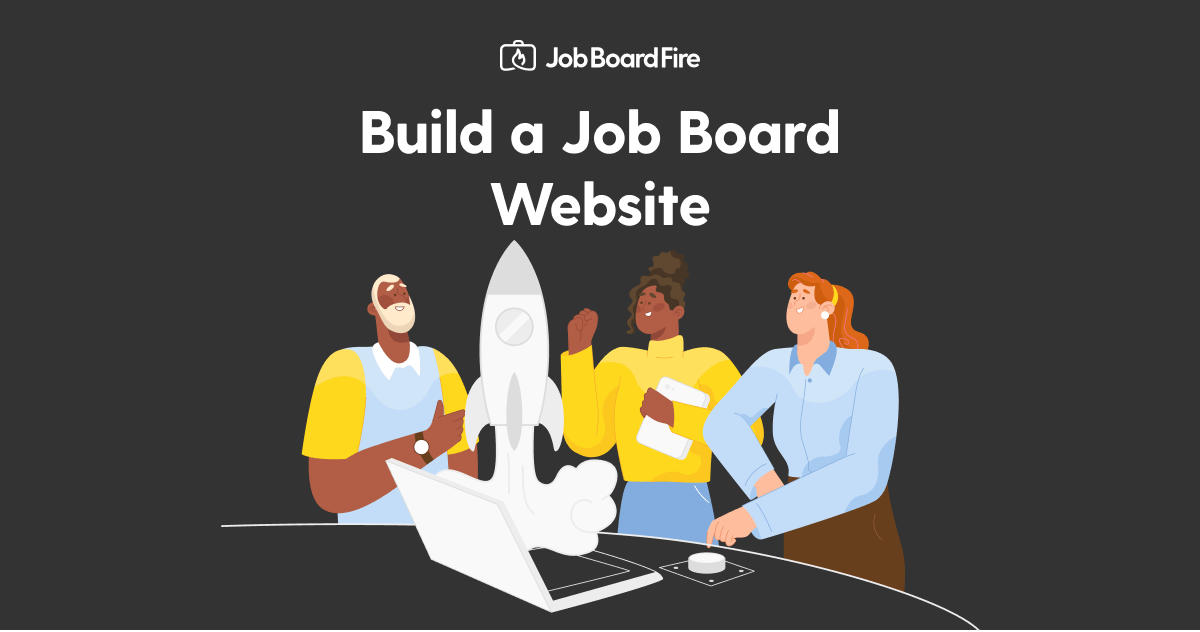
Build a Job Board Website
Creating a website for your job board business is an essential step in launching and growing your platform. There are several options for creating a website, including choosing a job board software, using a website builder with a job board plugin, using a job board theme, or hiring a development team. Each option has its own benefits and drawbacks, so it’s important to carefully consider your specific needs and goals before making a decision.
When To Use Job Board Software
If you choose to use job board software, you can take advantage of pre-built features and functionality that are specifically designed for job boards. This can save you time and money, as you won’t have to build everything from scratch.
When To Use a Generic Website Builder
Using a website builder can be a more affordable option, and it allows you to easily create a basic job board website if you have enough technical expertise. Many website builders also offer pre-built templates and features that are specifically designed for job boards, which can save you time and effort. However, website builders can be limited in terms of customization, are troublesome to maintain, and don’t offer as many advanced features as job board software.
When To Hire a Software Development Team
Hiring a development team can be the most expensive option, but it also gives you the most control over the design and functionality of your website. A development team can create a custom website that is tailored to your specific needs and goals, and they can also help you to add advanced features and functionality. However, hiring a development team can be time-consuming and may require a significant investment.
What Makes a Good Job Board Website?
Regardless of the option you choose, it’s important to design a user-friendly and professional-looking website. This can include using clean, modern design elements, as well as making sure that your website is easy to navigate and use.
Additionally, you’ll want to add necessary features that are essential for job boards, such as:
- SEO and Google for Jobs integration: One important feature of a job board is robust search engine optimization (SEO) and integration with Google for Jobs. This means that your job board is designed to be easily discoverable by search engines, which can help to increase its visibility and reach. By optimizing your website for relevant keywords and phrases, you can improve its ranking in search results, which can help more job seekers and employers to find your platform. Additionally, by integrating with Google for Jobs, you can make your job postings more discoverable on the world's largest search engine. This can help to drive more traffic to your website and increase engagement and retention on your platform. Overall, robust SEO and integration with Google for Jobs is an important feature for any job board, as it can help to improve its visibility and reach, and ultimately drive more success for your business.
- Modern, easy to use, and remote-friendly job search experience: A modern, easy to use, and remote-friendly job search experience is a key feature of any job board. This means that job seekers can easily and quickly find relevant job postings that fit their preferences and qualifications, regardless of whether they are looking for in-person or remote positions. By providing a user-friendly and intuitive search experience, you can help job seekers to find the right opportunities more quickly, which can increase engagement and retention on your platform. Additionally, by making it easy for job seekers to find remote positions, you can help to meet the growing demand for flexible and remote work opportunities.
- Talent network: A talent network is a feature that helps employers discover and connect with job seekers. This can include tools and resources that allow employers to search for job seekers with specific skills and experience, as well as tools that help job seekers to showcase their skills and qualifications. By providing a talent network, you can help employers to easily find and connect with potential candidates, and you can provide job seekers with a platform to showcase their abilities and stand out to potential employers. This can help to improve engagement and retention on your job board.
- Employer and job seeker communication: A way for employers and job seekers to communicate within the job board is an important feature that can help to improve engagement and retention on your platform. This can include tools and resources that allow employers and job seekers to easily connect and communicate in real-time, such as messaging and chat functions. By providing a way for employers and job seekers to communicate within your job board, you can make it easier for them to schedule interviews and discuss job opportunities, which can save them time and effort and ultimately improve the overall user experience. Additionally, by facilitating communication between employers and job seekers, you can increase engagement and retention on your job board.
- Customizable applicant tracking system for employers: A customizable applicant tracking system allows employers to easily track and manage the job application process, from posting a job to reviewing and interviewing candidates. By providing a customizable applicant tracking system, you can give employers the ability to tailor the system to their specific needs and preferences making them more efficient and effective. This can help to improve the overall user experience for employers, and make your job board more appealing and useful for them, which can save them time and effort.
- Flexible job taxonomy and filters: This can include options for categorizing jobs by category, location, type, salary, and any other relevant factors you can imagine. By taking advantage of flexible job taxonomy, you can make it easier for job seekers to find jobs that are relevant to their interests and qualifications, and you can make it easier for employers to find candidates who are a good fit for their job postings.
- Customizable fields for company and job seeker profiles: Decide what info employers and job seekers can fill out on their profiles, what's required, what's visible publicly, and what's searchable. This can include things like job seeker skills and experience, company size and industry, and more. By giving employers and job seekers the ability to tailor their profiles, you can make the job search experience on your platform more personal and relevant. It can also make it easier for employers and job seekers to connect and communicate.
- Ability to scrape and aggregate relevant jobs: Automatically collect and populate your job board with job postings from external sources, such as other job boards, company websites, and job search engines. This can save you time and effort, as you won’t have to manually enter job postings onto your job board. Additionally, by scraping and importing relevant jobs from other sources, you can make your job board more comprehensive and up-to-date, which can improve the user experience and make it more appealing to both job seekers and employers. Overall, the ability to scrape and import jobs from other sources is a valuable feature for any job board, as it can help to save time, improve the user experience, and keep job seekers coming back.
- Sophisticated monetization capabilities: Maximize revenue by selling and upselling high-margin recurring revenue products to employers at the right time. This can include offering sponsored job listings, as well as premium features and services that employers can purchase to enhance their job postings and attract more qualified candidates. By taking advantage of sophisticated monetization capabilities, you can give employers the ability to easily and conveniently purchase products and services that are relevant to their needs and goals, which can help to drive more revenue for your business. Additionally, by offering high-margin recurring revenue products, you can create a steady stream of income for your business, which can help to improve its financial stability and growth potential. Be sure to choose a solution that can support your business model.
Creating a website for your job board business requires careful consideration and planning. By choosing the right platform or development team, and designing a user-friendly and professional-looking website, you can create a website that is effective and successful in helping job seekers and employers connect.
Looking for all of the above, plus platform extensibility, customizability, and stellar support at every step of your job board journey? Check out our job board software.
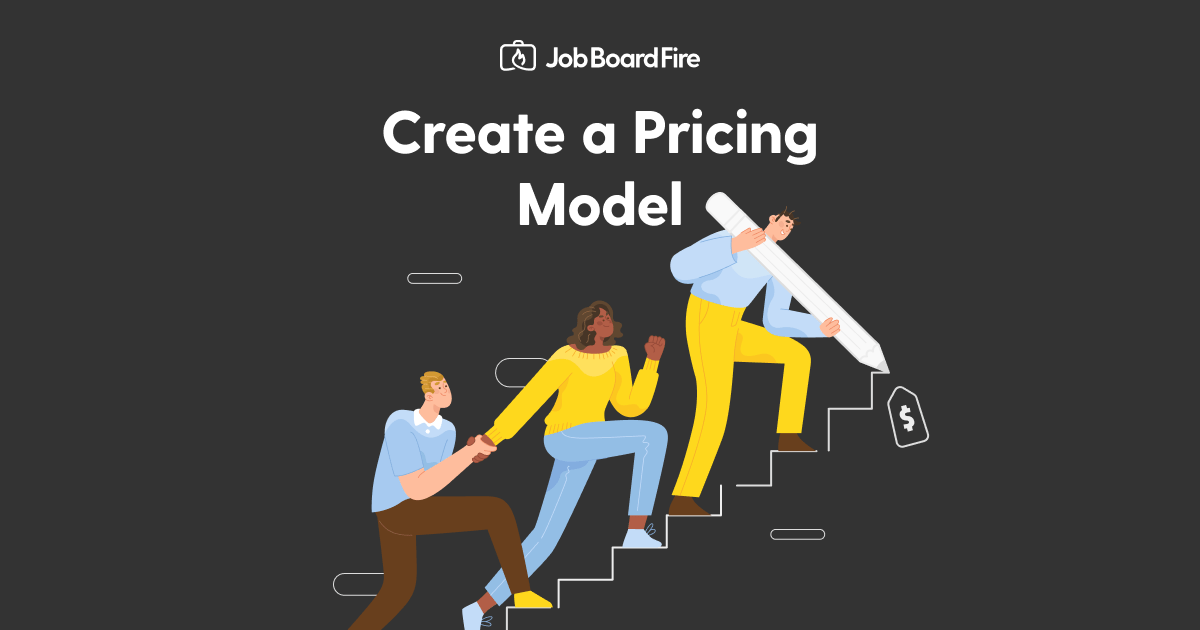
Create a Pricing Model
Creating a pricing model for a job board business can be a complex task, as you need to balance the need to generate revenue with the need to provide value and remain competitive in your industry. One key factor to consider when creating a pricing model is analyzing the competitive landscape in your industry to offer comparable prices. This means researching the prices and pricing models of other job boards in your market and using this information to inform your own pricing decisions.
Once you have a good understanding of the competitive landscape, you can start thinking about how to price and sell your core products and services. This can include pricing and selling individual job posts, as well as pricing and selling job post packages that allow employers to purchase multiple job posts at a discounted rate. You can also consider selling services, such as resume and cover letter building tools, that can help job seekers to improve their job application materials.
Another key aspect of your pricing model is upselling featured listings. This means offering employers the option to purchase additional features and services, such as highlighted job posts or priority placement in search results, that can help their job postings to stand out and attract more qualified candidates. By offering these options as add-ons, you can increase the value of your core products and services, and generate additional revenue for your business.
In addition to selling job posts and featured listings, you can also consider selling access to your talent network. This can include offering employers the ability to search for and connect with job seekers who have specific skills and experience, as well as offering job seekers the ability to showcase their abilities and qualifications to potential employers. By selling access to your talent network, you can provide value to both employers and job seekers, and generate additional revenue for your business.
One way to generate high-margin recurring revenue is by selling any of these products and services as subscriptions. This means offering employers the ability to purchase job posts, featured listings, and talent network access on a recurring basis, such as monthly or annually. By offering subscriptions, you can create a steady stream of revenue for your business, and improve its financial stability and growth potential.
Overall, creating a pricing model for a job board business requires careful consideration of the competitive landscape, the value of your products and services, and the needs and preferences of your target audience. By offering comparable prices, selling core products and services, upselling featured listings, selling access to your talent network, and selling subscriptions, you can create a pricing model that generates revenue and drives success for your business.

Create a Marketing Plan
Creating a marketing plan for a job board business is essential for promoting your platform and attracting job seekers and employers. A comprehensive marketing plan can help you to develop a clear and effective strategy for reaching your target audience, and it can provide a roadmap for implementing and managing your marketing efforts.
One key step in creating a marketing plan is identifying the most effective marketing channels and tactics for reaching your target audience. This can include researching your target audience and understanding their needs, preferences, and behavior, as well as assessing the effectiveness and feasibility of different marketing channels and tactics.
Some popular job board marketing channels, tactics, and strategies include:
Content Marketing
Content marketing is an effective way to promote a job board business, as it allows you to provide valuable and engaging information to job seekers and employers, and establish your brand as a thought leader in your industry. To use content marketing to promote your job board, you can follow these steps:
-
Develop a content marketing strategy: To effectively use content marketing to promote your job board, you need to develop a content marketing strategy that outlines your goals, target audience, content themes, distribution channels, and measurement methods. By developing a content marketing strategy, you can create a roadmap for your content marketing efforts, and ensure that they are aligned with your business goals and your target audience.
-
Create and publish content: Once you have developed a content marketing strategy, you can start creating and publishing content that provides value and engages your target audience. This can include blog posts, articles, videos, infographics, podcasts, and other types of content that are relevant to your target audience and your industry. By creating and publishing valuable and engaging content, you can build trust and credibility with your audience, and encourage them to visit your job board and engage with your content.
-
Promote your content: To maximize the impact of your content marketing efforts, it’s important to promote your content and make it visible to your target audience. This can include sharing your content on social networks, email marketing, and other distribution channels, as well as using search engine optimization and paid advertising to increase its visibility and reach. By promoting your content, you can increase its visibility and engagement, and drive more traffic and engagement to your job board.
-
Monitor and analyze your content performance: To effectively use content marketing to promote your job board, it’s important to monitor and analyze your performance. This can include tracking metrics such as website traffic, social media engagement, and conversion rates, as well as conducting surveys and focus groups to gather feedback from your audience. By monitoring and analyzing your content performance, you can identify what’s working and what’s not, and make adjustments to your content marketing strategy to improve its effectiveness.
Overall, content marketing is a powerful tool for promoting a job board business, as it allows you to provide valuable and engaging information to job seekers and employers, and establish your brand as a thought leader in your industry. By developing a content marketing strategy, creating and publishing content, promoting your content, and monitoring and analyzing your performance, you can use content marketing to increase brand awareness, attract job seekers and employers, and drive traffic and engagement with your job board.
Social Media Marketing
Social media marketing is an effective way to promote a job board business, as it can help to increase brand awareness, attract job seekers and employers, and drive engagement and traffic to your platform. To use social media marketing to promote your job board, you can follow these steps:
-
Choose the right social media platforms: There are many different social media platforms to choose from, and it’s important to select the ones that are most relevant to your target audience and your marketing goals. For example, if your job board focuses on a specific industry or location, you might want to focus on platforms that are popular among job seekers and employers in that industry or location.
-
Develop a social media content strategy: To effectively promote your job board on social media, you need to develop a content strategy that provides value and engages your target audience. This can include sharing job postings, industry news and trends, career advice, and other relevant and interesting content. By providing valuable and engaging content, you can build trust and credibility with your audience, and encourage them to visit your job board and engage with your content.
-
Use social media advertising: In addition to organic content, you can also use social media advertising to promote your job board and reach a wider audience. This can include running sponsored posts, sponsored stories, and other types of paid advertisements that are targeted to your target audience. By using social media advertising, you can increase the visibility and reach of your job board, and drive more traffic and engagement with your platform.
Monitor and analyze your social media performance: To effectively use social media marketing to promote your job board, it’s important to monitor and analyze your performance on social media. This can include tracking metrics such as likes, shares, comments, and clicks.
Community-led Marketing
Community-led marketing is an effective way to promote a job board business, as it allows you to leverage the power of your community to promote your platform and attract job seekers and employers. To use community-led marketing to promote your job board, you can follow these steps:
-
Identify and engage with your community: The first step in using community-led marketing to promote your job board is to identify and engage with your community. This can include identifying groups and individuals who are interested in your job board, and engaging with them through social media, forums, events, and other channels. By engaging with your community, you can build relationships, gather feedback and insights, and create a supportive and engaged group of individuals who can help to promote your job board.
-
Encourage community involvement: To effectively use community-led marketing to promote your job board, you need to encourage community involvement and participation. This can include providing incentives, rewards, and recognition to community members who contribute to your job board and promote it to others, as well as creating opportunities for community members to collaborate, share ideas, and support each other. By encouraging community involvement, you can create a dynamic and engaged community that can help to promote your job board and attract job seekers and employers.
-
Leverage community content and reviews: Another way to use community-led marketing to promote your job board is to leverage community content and reviews. This can include featuring community-generated content, such as blog posts, videos, and photos, on your website and social media channels, as well as sharing community reviews and testimonials to showcase the value and benefits of your job board. By leveraging community content and reviews, you can increase the credibility and trustworthiness of your job board, and encourage more job seekers and employers to engage with your platform.
Overall, community-led marketing is a powerful tool for promoting a job board business, as it allows you to leverage the power of your community to promote your platform and attract job seekers and employers.
By identifying and engaging with your community, encouraging community involvement, leveraging community content and reviews, and monitoring and engaging with your community, you can use community-led marketing to increase brand awareness, attract job seekers and employers, and drive traffic and engagement with your job board.
Email Marketing
Email marketing is an effective way to promote a job board business, as it allows you to directly target and engage with job seekers and employers who have expressed an interest in your platform. To use email marketing to promote your job board, you can follow these steps:
-
Build an email list: The first step in using email marketing to promote your job board is to build an email list of job seekers and employers who have expressed an interest in your platform. This can include collecting email addresses through sign-up forms on your website, registration forms at job fairs or networking events, or other methods. By building an email list, you can create a group of individuals who are interested in your job board and are more likely to engage with your emails.
-
Develop email templates: Once you have built an email list, you can start developing email templates that you can use to promote your job board. This can include templates for newsletters, job alerts, special offers, and other types of emails that are relevant to your target audience. By developing email templates, you can create a consistent and professional look and feel for your emails, and save time and effort when sending them to your email list.
-
Create and send emails: Once you have developed email templates, you can start creating and sending emails to your email list. This can include sending newsletters that provide updates and news about your job board, job alerts that notify job seekers of new job postings that match their interests and qualifications, special offers that provide discounts or incentives to job seekers and employers, and other types of emails that provide value and engage your audience.
-
Monitor and analyze your email performance: To effectively use email marketing to promote your job board, it’s important to monitor and analyze your performance. This can include tracking metrics such as open rates, click-through rates, and conversion rates, as well as conducting surveys to gather feedback from your audience. By monitoring and analyzing your email performance, you can identify what’s working and what’s not, and make adjustments to your email marketing strategy to improve its effectiveness.
By building an email list, developing email templates, creating and sending emails, and monitoring and analyzing your performance, you can use email marketing to increase brand awareness, attract job seekers and employers, and drive traffic and engagement with your job board. By implementing an effective email marketing strategy, you can create another valuable and engaging marketing channe for your job board businessl.
Paid Advertising
Paid advertising is an effective way to promote a job board business, as it allows you to reach a wider audience and drive more traffic and engagement to your platform. To use paid advertising to promote your job board, you can follow these steps:
-
Choose the right advertising channels: There are many different advertising channels to choose from, and it’s important to select the ones that are most relevant to your target audience and your marketing goals. For example, if your job board focuses on a specific industry or location, you might want to focus on channels that are popular among job seekers and employers in that industry or location.
-
Develop an advertising strategy: To effectively use paid advertising to promote your job board, you need to develop an advertising strategy that outlines your goals, target audience, ad formats, budget, and measurement methods. By developing an advertising strategy, you can create a roadmap for your advertising efforts, and ensure that they are aligned with your business goals and your target audience.
-
Create and run ads: Once you have developed an advertising strategy, you can start creating and running ads that promote your job board and attract job seekers and employers. This can include running display ads, search ads, social media ads, and other types of ads that are targeted to your target audience. By creating and running ads, you can increase the visibility and reach of your job board, and drive more traffic and engagement with your platform.
-
Monitor and analyze your advertising performance: To effectively use paid advertising to promote your job board, it’s important to monitor and analyze your performance. This can include tracking metrics such as impressions, clicks, and conversions, as well as conducting surveys and focus groups to gather feedback from your audience. By monitoring and analyzing your advertising performance, you can identify what’s working and what’s not, and make adjustments to your advertising strategy to improve its effectiveness.
By identifying your target audience, choosing the right advertising channels, developing an advertising strategy, creating and running ads, and monitoring and analyzing your performance, you can use paid advertising to increase brand awareness, attract job seekers and employers, and drive traffic and engagement with your job board.
Conclusion
Once you have identified the most effective marketing channels and tactics for your niche, you can start implementing and managing your marketing plan.
By developing a comprehensive marketing plan, identifying the most effective marketing channels and tactics, and implementing and managing your marketing plan, you can drive traffic and engagement with your job board.
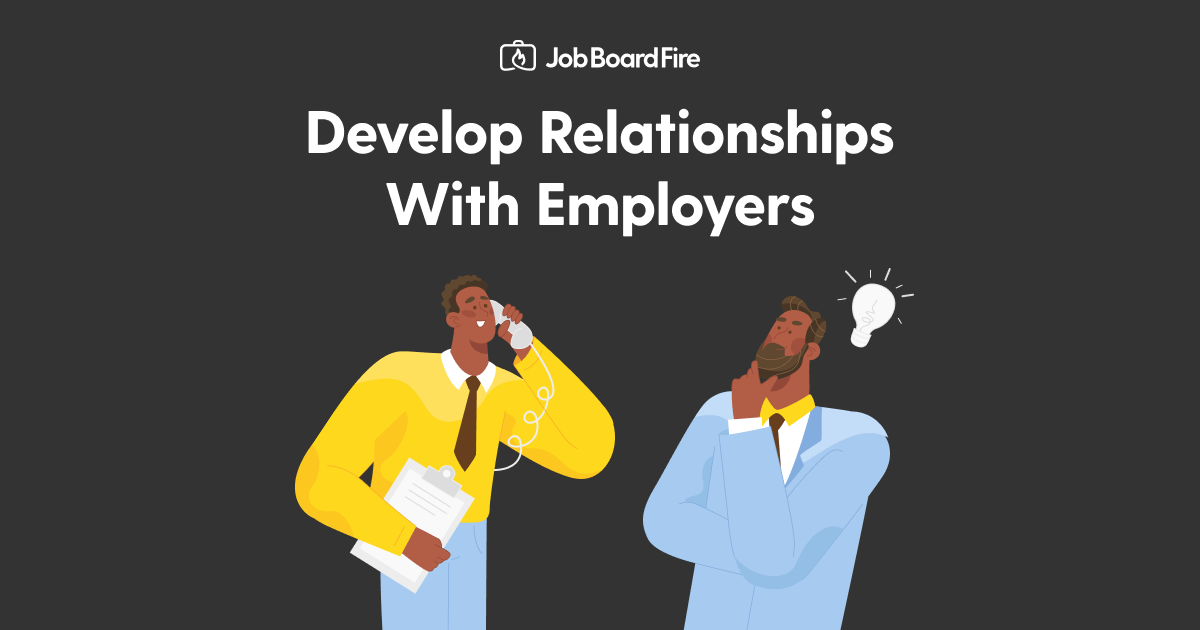
Develop Relationships With Employers
Developing relationships and partnerships with employers is an important part of running a successful job board business, as it allows you to build trust and credibility with your clients, and provide value and support to help them achieve their hiring goals. To develop relationships and partnerships with employers, you can follow these steps:
-
Identify and engage with potential employers: The first step in developing relationships and partnerships with employers is to identify and engage with potential clients. This can include researching employers in your target industries and locations, and reaching out to them through social media, email, phone, and other channels. By engaging with potential employers, you can learn more about their hiring needs and goals, and assess whether your job board can provide value and support to help them achieve their objectives.
-
Offer value and support: To effectively develop relationships and partnerships with employers, you need to offer value and support to help them achieve their hiring goals. This can include providing job posting and applicant tracking services, offering advice and guidance on hiring and recruiting, and sharing insights and trends to help employers stay up-to-date on the latest developments in their industry. By offering value and support, you can build trust and credibility with employers, and establish yourself as a valuable partner who can help them succeed.
-
Develop personalized solutions: To build strong relationships and partnerships with employers, you need to develop personalized solutions that are tailored to their specific needs and goals. This can include creating custom job posting packages, offering specialized applicant tracking systems, and providing training and support to help employers use your job board effectively. By developing personalized solutions, you can demonstrate your understanding of employers’ unique needs, and create a tailored and effective offering that can help them achieve their objectives.
-
Establish a relationship-building process: To effectively develop relationships and partnerships with employers, it’s important to establish a relationship-building process that outlines the steps you will take to connect with potential clients, offer value and support, and develop personalized solutions. By establishing a relationship-building process, you can create a systematic and effective approach that can help you to build strong and sustainable relationships and partnerships with employers. This can include creating a schedule for reaching out to potential employers, setting up regular check-ins to assess their needs and goals, and providing ongoing support and guidance to help them achieve their objectives. By implementing a relationship-building process, you can ensure that you are building relationships and partnerships with employers in a consistent and effective way, and providing value and support to help them succeed.
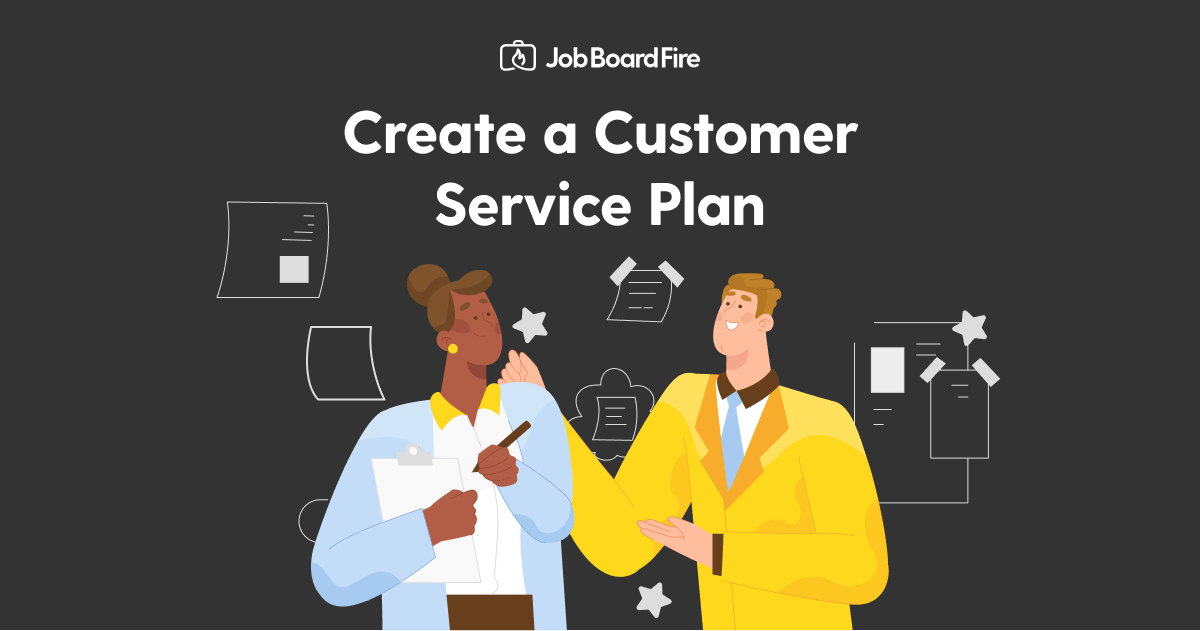
Create a Customer Service Plan
Developing a customer service plan is an essential part of running a successful job board business. With the right plan in place, you can ensure that your customers – both job seekers and employers – have a positive experience with your platform, which can help to improve customer satisfaction and increase retention.
One key aspect of a customer service plan for a job board business is creating a system for responding to job seeker and employer inquiries. This can include setting up dedicated email addresses or phone lines for customers to contact, as well as establishing clear guidelines for how and when inquiries should be responded to. For example, you may decide to prioritize urgent inquiries from employers who are looking to fill a position quickly, or from job seekers who are seeking assistance with their job search.
Another important aspect of a customer service plan is developing a plan for resolving customer complaints or issues. This can include creating a process for handling complaints, such as documenting the issue and working with the customer to find a resolution. It may also involve training your customer service team on how to handle different types of complaints and issues, as well as how to escalate them to management if necessary.
Finally, implementing a feedback and review system can help to improve the customer experience on your job board. This can include soliciting feedback from customers through surveys or other means, as well as encouraging customers to leave reviews on your platform or on third-party review sites. By regularly reviewing and responding to customer feedback, you can identify areas for improvement and make changes to your platform to better meet the needs of your customers.
Overall, a well-developed customer service plan is crucial for a successful job board business. By creating a system for responding to inquiries, developing a plan for resolving customer complaints, and implementing a feedback and review system, you can improve the customer experience and increase satisfaction with your platform.

Analyze and Improve Your Performance
To effectively analyze and improve the performance of your job board business, you need to identify key performance indicators (KPIs) that can help you to measure and assess the success of your platform. Some possible KPIs for a job board business can include:
-
Average number of applications per job posting: This metric measures the average number of applications received for each job posting on your job board, and can help you to assess the quality and relevance of job seekers to a job posting.
-
Average time to fill a job posting: This metric measures the average amount of time it takes for a job posting to be successfully filled, and can help you to assess the efficiency and effectiveness of your job board in connecting job seekers with employers.
-
Candidate retention rate: This metric measures the percentage of candidates who are successfully hired and remain with the company for a defined period of time, and can help you to assess the effectiveness of your job board in helping employers find and retain top talent.
-
Employer churn rate: This metric measures the percentage of employers who stop using your job board within a defined period of time, and can help you to assess the satisfaction and loyalty of your employer clients.
-
Job seeker churn rate: This metric measures the percentage of job seekers who stop using your job board within a defined period of time, and can help you to assess the satisfaction and loyalty of your job seeker audience.
-
Job posting engagement rate: This metric measures the level of engagement of job seekers with a job posting, and can include metrics such as clicks, views, and shares. This can help you to assess the popularity and relevance of a job posting, and identify areas for improvement.
-
Employer engagement rate: This metric measures the level of engagement of employers with your job board, and can include metrics such as job postings, applicant tracking, and other services and products. This can help you to assess the value and effectiveness of your job board, and identify areas for improvement.
-
Job seeker engagement rate: This metric measures the level of engagement of job seekers with your job board, and can include metrics such as job searches, applications, and other services and products. This can help you to assess the value and effectiveness of your job board, and identify areas for improvement.
-
Customer lifetime value: This metric measures the total value of a customer over the course of their relationship with your job board, and can help you to assess the long-term value and potential of your audience. By tracking and analyzing this KPI, you can gain insights into the long-term potential of your job board business, and identify areas for improvement and growth.
Once you have identified your KPIs, you can analyze your metrics to identify areas for improvement, and implement changes and improvements to increase the effectiveness of your job board. This can include improving the user experience of your website, adding new features and services, and implementing a customer feedback and review system to gather feedback from your audience. By analyzing and improving the performance of your job board, you can ensure that your platform is providing value and support to your target audience.

Manage Risks and Challenges
Running a job board business can be a rewarding and challenging experience, and managing the risks and challenges that come with it is an essential part of success. Some common risks and challenges of running a job board business can include:
- Competition: To manage competitive risk you can conduct market research to assess the competitive landscape, identify your unique value proposition, and implement strategies to differentiate your job board from others.
- Technology: Job boards rely on technology to function, and technical issues can disrupt your platform and impact your audience. To manage this risk, you can implement robust technology infrastructure, regularly test and update your systems, and have contingency plans in place for unexpected issues. Job board software providers like Job Board Fire help ease the burden of managing your own technology platform so you can focus on growing your job board business.
- Customer satisfaction: Job seekers and employers are the core of your job board business, and their satisfaction is essential to your success. To manage this risk, you can implement a customer feedback and review system, regularly assess customer satisfaction, and implement strategies to address any issues or concerns.
Overall, managing the risks and challenges of running a job board business requires a proactive and strategic approach, and it’s important to regularly assess and address potential risks and challenges to ensure the success and sustainability of your platform.
Stay up to Date with Industry Trends and Best Practices
Staying up to date with the latest trends and best practices in the job board business is key to staying ahead of the competition.
To do this, you can join industry organizations, attend conferences and events, follow industry publications and blogs, and connect with peers and experts. This will give you access to important news, insights, and analysis, and can help you to stay on top of the latest developments in the field.
It's important to regularly engage with industry resources and networks to gain valuable knowledge and stay up to date.
An easy way to stay up to date on job board related news and trends is to subscribe to the Job Board Academy by Job Board Fire.
Conclusion
Starting a job board business can be a rewarding and lucrative venture. By carefully identifying your target audience and choosing a niche, you can focus your efforts on a specific group of customers and increase your chances of success. Building a user-friendly and professional-looking website, adding necessary features, and creating a comprehensive marketing plan are all key steps in launching and promoting your job board. Additionally, developing relationships and partnerships with employers, analyzing and improving your performance, and staying up to date with industry trends and best practices can help you to manage risks and challenges, and ensure the long-term success of your job board business.
Ready to kick off your job board business? Get a demo of our job board platform.
Learn from our Job Board Academy
Access our free resources with everything you need to know to build, launch and scale a successful niche job board.



